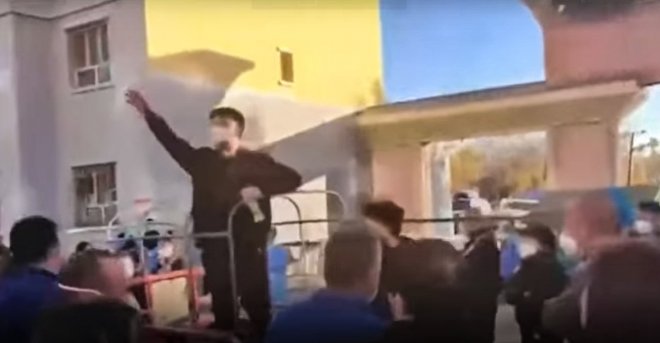
Chinese authorities in Xinjiang are investigating three men after internet users "maliciously flooded" a live-streamed government press conference with comments critical of COVID-19 restrictions in the regional capital, Urumqi, according to the regional internet regulator.
The Xinjiang cyberspace administration said police are now investigating a 41-year-old internet user surnamed Li from Kashgar, a 28-year-old man surnamed Huang and a 36-year-old man with family name Li, both from Urumqi.
Li from Kashgar allegedly used short videos on Douyin, the Chinese edition of TikTok, to incite others to take part in the commenting activity. He stands accused of "inciting others to maliciously comment during a news media live stream" on social media, the agency said. "[He] disrupted online public order and caused an adverse social impact," it said in a statement reposted by the China Digital Times website.
Huang had "maliciously commented using the word Urumqi" under a social media live stream of the State Council"s Nov. 11 press conference on the latest COVID-19 disease control and prevention measures, the statement said.
The comments came after the authorities began imposing strict lockdowns across Xinjiang in August and September.
The word “Urumqi” is likely particularly sensitive after video clips of lockdown protests in the city appeared online, prompting the Xinjiang Communist Party secretary to visit districts on Nov. 7 where the protests took place, while local police officers said three Han Chinese men had been detained for "spreading rumors" about COVID-19.
RFA reported in September that 600 Uyghurs from a village in Ghulja in the northern part of Xinjiang were detained after they protested a lockdown that, according to some locals, had resulted in the deaths from starvation of as many as a dozen residents.
The cyberspace administration said Li from Urumqi had "incited others to follow suit," also disturbing public order and causing a negative social impact, it said.
"The internet is not outside the law," the administration said. "The relevant departments will take this seriously and investigate any recent violations … during live streams … and will not tolerate malicious comments."
It called on social media users to report anyone engaged in such activity to the authorities.
Building public frustration
Jiangsu-based current affairs commentator Zhang Jianping said public frustration with the rolling lockdowns and mass compulsory testing of the zero-COVID policy is growing, and that people in Xinjiang have been confined to their homes since August.
"People have been locked into their homes for a long period of time, and depression has been on the rise," Zhang said. "Some have openly resisted, or expressed their dissatisfaction in public."
"[The lockdowns] are obviously aimed at maintaining stability, rather than at the scientific control of disease," he said. "Even some officials are now saying we have toed the line for too long."
Current affairs commentator Li Ang said the government now treats most people as dissidents or opponents.
"Ordinary people are now all regarded as potential causes of instability," Li told RFA. "[The Communist Party] has set itself up against the people, and everything it does is about protecting its hold on power. They have to eliminate any voices they regard as unstable or dissonant."
"The police have an internet monitoring division, and the government has the cyberspace administration, and they are both dedicated to watching for such things like hawks," he said.
Six days ago, the Urumqi police detained 12 people for "spreading rumors" linked to COVID-19 online, holding some under criminal detention, and others under administrative sentences, which can be handed down to perceived "troublemakers" for periods of up to 15 days without the need for a trial.
A man surnamed Bai from Urumqi had allegedly "spread rumors" that all work units had been shut down as part of the local response to an outbreak of coronavirus in the region, and that people were eligible for daily subsistence payments.
Another man surnamed Chen had claimed that residents had burst out of their homes, where they had been under lockdown.
Meanwhile, a man surnamed Zhou from Hotan and Mou from Urumqi had made "inappropriate remarks about the pandemic," and "incited others to go out and gather, disrupting public order," official reports said at the time.
Images taken from videos obtained by RFA Uyghur Service earlier this month showed a new, prefabricated quarantine facility in Xinjiang, although official figures released by the government at the time indicated only a couple of dozen new, symptomatic cases a day in the region, which has a population of nearly 26 million.
Uyghurs and other Turkic minorities in the region have also been subjected to a years-long crackdown as part of a broad “anti-terrorism” campaign. A U.N. report in August said China’s effort to Sinicize the region has included human rights abuses and potential crimes against humanity. China denounced the report, which it said was the result of pressure from western governments.
Translated and edited by Luisetta Mudie. Edited by Malcolm Foster.